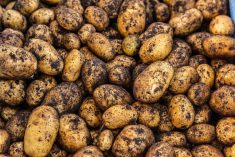The record soybean crops that are fast approaching harvest in Latin America will put the Southern Cone region’s infrastructure to the test, more so in Brazil than in Argentina.
Isolated harvesting in the world’s No. 2 soybean grower Brazil has already started in the centre-west, the main soy-growing region which has some of the greatest logistic and storage challenges.
“This year will be different with the bigger crop and carry-over stocks from last year,” said grains analyst Carlos Cogo. “The problem of storage capacity has been growing since 2007-08.”
Read Also

Mazergroup’s Bob Mazer dies
Mazergroup’s Bob Mazer, who helped grow his family’s company into a string of farm equipment dealerships and the main dealer for New Holland machinery in Saskatchewan and Manitoba, died July 6 from cancer.
Cogo, who said he had just completed a study of storage capacity for grains in Brazil for a large local corporate client in the sector, said corn accounted for about 11 million tonnes of the 17 million tonnes of carry-over stocks in grains going into 2010.
In past years, stocks of the earlier season’s harvest at this time of year averaged five million to seven million tonnes.
Brazil’s static storage capacity for grains is about 133 million tonnes, Cogo said, while its incoming grains harvest is seen at 141 million tonnes plus the carry-over stocks.
Fortunately, about 12 million tonnes of grain will be sold and put into trucks, trains and ships by April, before half the crop is even harvested. This will lower the shortfall in space to about 13 million tonnes but will be insufficient to take pressure off producers to sell.
Brazil is forecast to harvest a record 64 million to 65 million tonnes soy crop, while Argentina, the world’s No. 3 soy producer after the United States and Brazil, is about to start harvest on a record 50-million-tonne-plus soy crop in a couple months.
But industry analysts in Argentina do not see many serious infrastructure problems aside from the usual shortage of trucks and normal congestion at the ports during the peak of harvest.
Last year’s drought-hit crop of 31 million tonnes forced Argentine crushing plants to slow production lines and idle capacity rates soared.
“There will still be a bit of unused capacity, but we will be getting back to normal levels,” said Patricia Bergero, an economic analyst at Rosario grains exchange, the country’s main grains market.
She said that while the soy crop was expected to beat the record 2006-07 harvest of 47.5 million tonnes, lower corn production meant transport and storage facilities should be able to cope this year.
Rogelio Ponton, head of economic studies at the Rosario exchange, said a boom in sales of silo bags meant farmers could already store between 25 million and 40 million tonnes of grains inside the farm gates.
U. S. Seeks To Undo Dairy Deal
The U. S. Justice
Department filed a lawsuit Jan. 22 against Dean Foods Co. seeking to undo its April 2009 purchase of dairy-processing plants from Foremost Farms USA because of competition concerns.
The Justice Department argued the deal eliminated “substantial competition” between the two companies in the sale of milk to grocery stores, schools, convenience stores and other retailers in Illinois, Michigan and Wisconsin.
In a lawsuit filed in U. S. District Court in Wisconsin, the Justice Department’s antitrust division asked a judge to order Dean Foods to sell the dairy-processing plants it acquired and notify the government before any future acquisitions of milk-processing operations.
“The purpose of the department’s lawsuit is to restore competition so that schools, grocery stores and other retailers in Illinois, Michigan and Wisconsin will pay lower prices for their milk,” said Christine Varney, assistant attorney general in charge of the department’s antitrust division.
Because the deal value was below a certain threshold at the time, $65.2 million, the companies did not have to notify antitrust authorities before moving forward with it. The states of Illinois, Michigan and Wisconsin joined the Justice Department’s lawsuit.
Dean Foods said in a statement it was disappointed with the government’s decision to challenge the deal, calling the lawsuit “unsound, both legally and economically.
“We are anxious to have the opportunity to defend this pro-competitive transaction in court,” the company said.


















